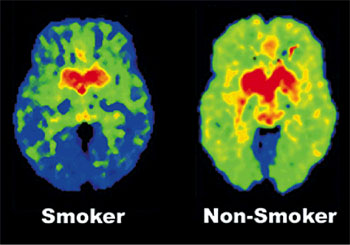 February 27, 2011 - Smoking can cause permanent damage to adolescent’s developing brains, according to VU university researchers in the latest issue of Nature Neuroscience magazine.
February 27, 2011 - Smoking can cause permanent damage to adolescent’s developing brains, according to VU university researchers in the latest issue of Nature Neuroscience magazine.
PAPER: Lasting synaptic changes underlie attention deficits caused by nicotine exposure during adolescence, Danielle S Counotte, Natalia A Goriounova, Ka Wan Li, Maarten Loos, Roel C van der Schors, Dustin Schetters, Anton N M Schoffelmeer, August B Smit, Huibert D Mansvelder, Tommy Pattij & Sabine Spijker, Nature Neuroscience - Published online 20 February 2011, ABSTRACT/FULL TEXT..
A directly related news brief:
Nicotine has a negative impact on the developing adolescent brain..
Smoking can cause permanent damage to adolescent’s developing brains, according to VU university researchers in the latest issue of Nature Neuroscience magazine. It is the first time that the effect of nicotine on adolescent brains has been researched and the results show smoking can ‘lead to cognitive impairments in later life’. This could mean that people who start smoking at a young age could have ‘lasting attentional disturbances’, the researchers said.
The team carried out their experiments on young rats but say the effect can be translated to humans because of the similarities between the rat and human brains. The rats which had been given nicotine while adolescents performed between 5% and 10% worse than a control group in tests at a later age. But rats given nicotine as adults showed no difference in performance.
‘Translating this to the human situation, we are talking about youngsters who start smoking between the ages of 12 and 16,’ researcher Sabine Spijker told the Volkskrant. ‘They will become fine workers when they get older, but as soon as things get difficult or too much is asked of them, they drop out more quickly than others. Then they cannot stay focused.’
Nicotine also makes young rats more impulsive.
Reference: Smoking can damage teenage brains permanently: VU research, DutchNews.nl, 2/21/2011
Bringing the World of Tobacco Control closer together..
PAPER: Nicotine on adolescent brains can lead to cognitive impairments in later life..
Subscribe to:
Post Comments (Atom)


To Provide Public Awareness
Purpose
About Us
Contact Us
2008 HIGHLIGHTS
TOPIX PAPERS - 2008 & 2009..
Archive
-
▼
2011 (490)
-
▼
02/27 - 03/06 (32)
- NYC Mayor Bloomberg making the case for banning sm...
- South Korea - lung cancer patients taken tobacco s...
- South Korea - One out of every 10 female high-scho...
- Menthol Cigarettes - alter the menthol concentrati...
- Venezuela - canceled smoking ban in public places..
- Bulgaria - Bulgartabac 2010 profit 16.5 times larg...
- West Virginia - tobacco tax hike died in committee...
- WHO warns Southeast asian nations rise in non-comm...
- New Zealand - New Plymouth central business distri...
- South Australia - 100 percent smoke-free outdoor e...
- Tasmania - Cancer Council Calls For Tightening ...
- FDA TPSAC - Menthol Draft Report - two draft chap...
- FDA TPSAC - Draft Report - Menthol May NOT Raise ...
- Tobacco Merchants Association annual meeting an...
- Australia - illicit cigarette trade increase since...
- Uganda must get these people to enforce the law -...
- Jamaica - tackle smoking and save lives and money..
- PAPER: women who smoke cigarettes during the first...
- More on R.J. Reynolds Tobacco Co./Lorillard Tobacc...
- Norway - smoking plummets among young people..
- Canada - Tobacco warning labels to appear on inter...
- Germany - kids just don't think smoking is cool an...
- Franciscan Health System - seeking a job don't use...
- Honduran president must veto changes to the nation...
- Utah - bill banning nicotine candy sales voted down..
- California - Lance Armstrong is co-chair of the Ca...
- Susan Ivey, chairman, president, and CEO of Reynol...
- PAPER: Nicotine on adolescent brains can lead to ...
- Nigeria - can women help get the National Tobacco...
- Melbourne, Victoria, Australia - don't smoke arou...
- It will take an act of the U.S. congress to ban sm...
- Our children - NO - to dissolvable smokeless tob...
-
▼
02/27 - 03/06 (32)
© Copyright Notice: The content of this website is for information education purposes only and any newsbrief may be used only as "fair use" for information/education purposes with permission of the authors and providing that original references and associated reference links are included in HTML format.
0 comments:
Post a Comment